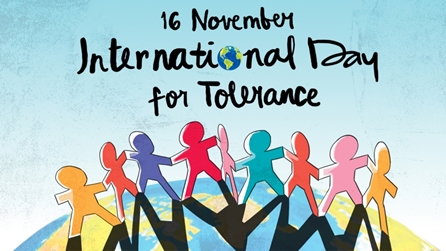Tolerance: The Virtue That Makes Peace Possible

Tolerance sees no race, ethnicity, gender or sexuality. Tolerance sees human beings. Source: https://www.gicj.org/positions-opinons/gicj-positions-and-opinions/1287-international-day-for-tolerance-nov-16
November 13, 2019
The United States is the land of cultural diversity; a melting pot where nationalities, cultures, and ethnicities come together and fused into one big country. The beauty of this nation is that nobody is 100 percent American and tolerance between one another is crucial for its survival.
“Tolerance is respect, acceptance and appreciation of the rich diversity of our world’s cultures, our forms of expression and ways of being human. It is fostered by knowledge, openness, communication, and freedom of thought, conscience and belief,” Declaration of Principles on Tolerance stated. “Tolerance is harmony in difference. It is not only a moral duty, it is also a political and legal requirement. Tolerance, the virtue that makes peace possible, contributes to the replacement of the culture of war by a culture of peace.”
It was on Nov. 16, 1995 that the United Nations Educational, Scientific and Cultural Organization (UNESCO) adopted the Declaration of Principles on Tolerance and proclaimed the year as “The Year of Tolerance” and 1996 as Follow-up Plan of Action for the Year. It has become an annual event for society to celebrate the International Day for Tolerance to raise awareness of the injustices and oppressions around the world, acknowledging the negative effects of it.
The Declaration stated “it is essential for international harmony that individuals, communities and nations accept and respect the multicultural character of the human family,” highlighting the need to give the same social and economic opportunities at the state level. Tolerance is important within social dimensions because, with the globalization of the economy, the large migrations and the changing of societal patterns, the world is more and more diverse every year.
Tolerance is important so that everybody feels safe and confident to be themselves.
As the United Nations explains, fighting intolerance requires law, education, individual awareness and local solutions; law to ban and punish hate and discrimination against minorities, education to teach people their rights and freedoms, as well as other cultures, nations and religions.
Individual awareness to be aware of their behavior in society, such as stereotyping, insulting and racism. Local solutions to take the matter into our own hands and not wait for governments and institution to do something.
History has shown that people often fear the unknown, of what they are not used to seeing or what clashes with their ideals — anything that essentially counters with their everyday lives.
However, this can change if younger generations make acceptable what today’s society punishes and discourages by promoting acceptance and respecting human beings that are naturally diverse. Diverse in physical appearance, values, language, traditions and in behaviors.
“The diversity of our world’s many religions, languages, cultures and ethnicities is not a pretext for conflict, but is a treasure that enriches us all,” the United Nations stated.



